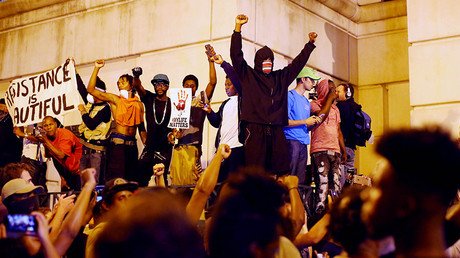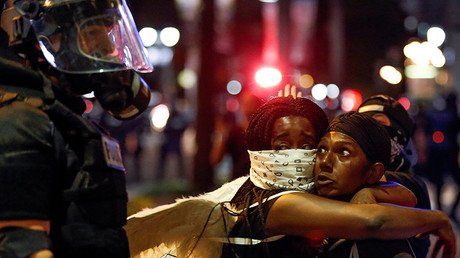'Black Lives Matter uses issue of police violence to achieve bigger agenda'
Is Black Lives Matter a Black power and identity movement? Or is it a movement struggling for recognition because Blacks in America have felt oppressed for so long?
A curfew went into effect for Charlotte, North Carolina during a third night of protests against the police. Unrest broke out in southeastern US city on Wednesday when a Black Lives Matter march spiraled out of control after Tuesday's fatal police shooting of a Black civilian.
Riot police were called into action following the violence which resulted in nine people being injured and over 40 arrested. One person that was shot during the violence later died in hospital.
The police have said they won't enforce the curfew if demonstrations remain peaceful.
RT discussed the issue of police brutality and racial profiling with Richard Spencer, from AlternativeRight.com and Wisconsin State Representative Mandela Barnes.
RT: These are just the latest in a string of protests that have turned violent. Are we any closer to a solution?
Mandela Barnes: Absolutely not. It is unfortunate when the protests turn violent. But it is also unfortunate when a simple traffic stop turns violent. And that’s what people are so frustrated about. That is what people on the streets and I am frustrated about…When you look at the Tulsa, Oklahoma shooting that was absolutely uncalled for. The man was walking at a very slow pace away from his car with his hands up. That was probably the instant that captured more Americans in seeing what police violence actually looks like. There was no justification for that shooting right there.
They say you don’t fight violence with violence. However, you don’t create violence in a situation that didn’t call for violence either. This is human reaction when you feel that your rights have been infringed upon, when you feel your safety could be in jeopardy for a simple traffic stop or any run-in with the law, this is how it boils over, this is how tensions are built up and explode.
Police in Charlotte are shooting these plastic spheres, in response to thrown bottles. They scatter crowds. pic.twitter.com/d5r4x9JaLK
— Matthew Teague (@MatthewTeague) September 22, 2016
RT: Police brutality is often seen as the main cause of the violence we're seeing. Is that too simplistic or are there deeper issues at play?
Richard Spencer: Let’s look at the case that has sparked this Charlotte riots and that’s what they are. Keith Lamont Scott, this was not just simply a traffic stop. Keith Lamont Scott had a weapon; the weapon has been found. He was not simply reading as someone said and this was picked up as a meme. That is false. No book has been found. He approached police officers with a weapon, he was shot by a police officer, who happened to be Black, I should mention, for the fact that he was effectively not complying with the police. There are millions of interactions between Americans and police every year. It is somewhere between 12 and 14 million every year. Only a couple of hundred of those actually involve violence. That is a tiny percentage, far less than one percent, of police interactions with American citizens resulting in violence.
What we have here is that the Black Lives Matter protesters will take an unfortunate incident and use it as a way to express something much bigger, a much bigger concern that they have. Black Lives Matter is not really about police violence because it is not a problem in the US. What it is about is a Black power movement; you could say it is a Black identity movement. They are using police violence as, you could say, an excuse or as a spark, as a way of expressing their bigger agenda. And that’s what this is about. It really isn’t about these cases. Every time you look into these cases, sometimes they are ambiguous, sometimes they are not ambiguous. The fact is if you resist a police officer, you are effectively committing suicide. That’s not nice, but it is just the facts.
Mandela Barnes: It is not a fair critique, one. And two, we are not even sure about what happened, whether it was a book or a gun. Because we saw even back with Walter Scott in South Carolina after that man was gunned down, you saw an officer go and try to plant a gun on his person. So we can’t use that as an excuse. Second, we can’t use the fact that the officer was Black. Because we do have Black officers doesn’t mean that they are always 100 percent behind the community. Case in point, our sheriff in Milwaukee Country, David Clark. So no, this is not a fair criticism of the Black Lives Matter movement. If you are to say that this is a Black power struggle may be it is because Blacks in America have felt powerless for so long and you see that manifest in these sorts of interactions. And you see a total disconnect from so many people in the American public - especially those in power - when it comes to the struggle for Black people in America.
“I think it is fundamentally endemic. We’ve had Freddy Gray, when the police officers shoot unarmed people; they are not brought to justice. There is no recompense. Michael Brown I believe was murdered in the US, yet if you look at the report of the previous shooting, they said they saw a tall black man who looked dangerous. The key questions is because he was black, he was seen as dangerous and as being criminal. And I think it leads to lethal shootings. In North Carolina, the majority of the people killed by the police are black even though they form less than 28 percent of the general population.” - Weyman Bennett, National Secretary Stand Up to Racism.
RT: Police are often criticized for how they handle the protests. Where do you think the blame lies?
MB: There has to be a mutual respect. I don’t say this with animus towards police. I have friends who are police officers and I wish them the best, especially as they go out and they do the work that they are supposed to and the way that they are supposed to within our community. So with that being said, across the country in communities takes respect for police work, respect from police officers for the communities that they police and respect from the community for the officers. But that means there needs to be dialog. Every police interaction shouldn’t be one that leads to arrests. Every police interaction shouldn’t have punitive effects. We have to work together if we want to move forward…. There are so many in the conservative movement and also the Alt-Right movement who feel that racism was not even an issue until President Barack Obama was elected President of the United States. And that is where we get to the disconnect.
The calmest man in Charlotte is protester Henry Lee, 51, who silently refuses to leave his chair. pic.twitter.com/8abgzPwoDZ
— Matthew Teague (@MatthewTeague) September 22, 2016
RS: For my entire life we’ve been in this endless merry-go-round where people will come and claim that we need to have this conversation about race. We need to finally do something about race; we need to have a dialog about race. The fact is for decades this country has been effectively obsessed about race, and we’ve been obsessed about solving this problem. You could say it is an African-American problem, in fact there are major disparities: economic, educational, life outcome, the world view disparities between White people and Black people… We are not going to solve the race problem with yet another congressional investigation into police violence.
The statements, views and opinions expressed in this column are solely those of the author and do not necessarily represent those of RT.















